Ghana’s public debt exceeds GH¢650b and 62.7% of GDP as at February 2024
 There is no doubt that Ghana’s economy is in deep crisis, no matter how much positivity one talks about. With the total public debt running up to GH¢658.6 billion, approximately $53.1 billion as at February 2024, it is 62.7 per cent of GDP.
There is no doubt that Ghana’s economy is in deep crisis, no matter how much positivity one talks about. With the total public debt running up to GH¢658.6 billion, approximately $53.1 billion as at February 2024, it is 62.7 per cent of GDP.
The external debt stands at GH¢380 billion, and that is 36.1 per cent of GDP and the domestic debt is computed at GH¢278.7 billion; which is 26.5 per cent of GDP.
Any economy that has accumulated debt exceeding 60 per cent of GDP is in crisis and needs emergency and prudent measures to recover. But it does appear the government might have exhausted its strategies in bringing things under control, or it never had the ability to do much in the first place.
In the meantime, every indication shows that the government has been reckless with its borrowing from its first day in office eight years ago. It went on a borrowing and spending spree with no clear plan in sight, as it seemed, and would not listen to warnings and signals from citizens and critics. It was doing at it pleased with the economy as if the economy would take care of itself.
The belief that the International Monetary Fund (IMF) programme would turn things around hasn’t been as effective as believed. Unless the government strictly follows the prescriptions – but that is anything but impossible, considering that for this government and for most, politics takes precedence over and above good governance, and this year being an election year, caution would be thrown to the wind and unrestrained spending would be done.
The impact of the high debt could mean rising inflation, and in the worse case scenario, the government may resort to printing more money to pay part of the debt, which itself invariably causes inflation. The year-on-year inflation rate slowed in April to 25 per cent from 25.8 per cent the previous month, according to the Ghana Statistical Service.
The situation overall has the potential to make the country unattractive to investors, further exacerbating the economic situation.
In relation to the poor performance of the cedi against the major world currencies like the US dollar, an economist is advocating that the country adopts the US dollar to save the economy.
According to the Bank of Ghana the cedi has depreciated by about 14.6 per cent to the US dollar as of May this year.
Dr John Kwabena Kwakye, Director of Research at the Institute of Economic Affairs (IEA), has said Ghana should adopt the US dollar as the country’s currency to stabilise the economy.
“Stabilising the economy is not rocket science. If we feel we cannot maintain the cedi, let us abandon it and adopt the dollar. Let us dollarise the economy,” he was cited as saying.
Meanwhile, another economist has blamed the IMF programme for the cedi’s depreciation.
Professor Godfred Bokpin, an economist and finance expert, has been cited in reports to have attributed part of the cedi’s depreciation to the IMF’s programme with the country.
He said under the IMF programme, the Bank of Ghana was barred from intervening in the currency exchange market when the cedi fell against major trading currencies.
That situation prevented the Bank of Ghana (BoG) from entering the foreign currency market to stabilise the cedi, he argued.
“Part of the reason why the cedi is depreciating is also consistent with the latest IMF-supported programme. Under the IMF-supported programme, they favour a stable exchange rate.
“This limits the ability of the central bank to be in the market and fight off the depreciation through our reserves.
“Part of the IMF programme is to build our reserve of three months of import cover for 2026…What that means is that it tightens the hands of the central bank to intervene in the market to sell dollars to stabilise the cedi.
“Now they cannot do that under an IMF programme,” he said.
In May 2023, the IMF Executive Board approved a $3 billion External Credit Facility (ECF) with Ghana for 36 months.
Prof. Bokpin also identified other factors that have influenced the cedi’s recent depreciation.
He said the cedi’s depreciation was also triggered by the delayed foreign debt restructuring, which affected the receipt of the third tranche of the ECF under the IMF programme.
Meanwhile, the Minister of Finance, Dr. Mohammed Amin Adam, is optimistic things would improve. He says the government is expecting $2.32 billion inflows from its development partners to stabilize the cedi.
“We therefore expect total disbursements of at least $2.32 billion before the end of the year to add to the significant foreign exchange reserves already built up by the Bank of Ghana,” he said.
He said inflows from the World Bank, the third tranche of the IMF Extended Credit Facility, and cocoa syndicated proceeds will aid government efforts to stabilise the cedi.
“The disbursements of the third tranche under the second Review of the IMF-supported PC-PEG after the IMF Executive Board approval in June 2024; disbursement from other ongoing projects, including the $150 million World Bank Loan following the parliamentary approval last week Friday,” he said.
The road ahead for economic recovery looks long and arduous, and with an election on the horizon, it would likely be a difficult year for most Ghanaians, even as the cost of living also continues to rise.
By Emmanuel K Dogbevi
Copyright ©2024 by NewsBridge Africa
All rights reserved. This article or any portion thereof may not be reproduced or used in any manner whatsoever without the express written permission of the publisher except for the use of brief quotations in reviews.
